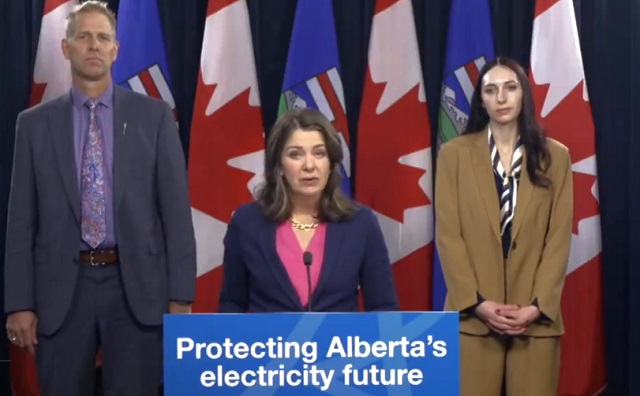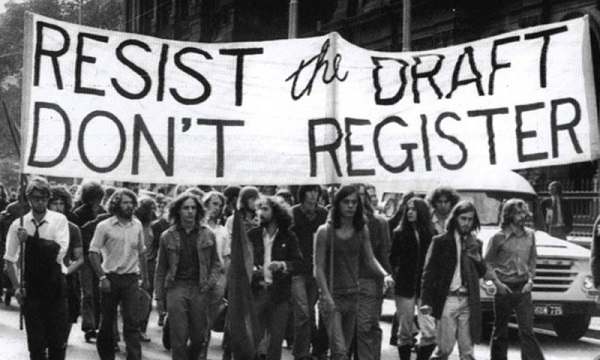Alberta
Danielle Smith vows to protect Albertan farmland from Trudeau’s radical ‘net zero’ push

From LifeSiteNews
‘You cannot build wind turbines the size of the Calgary tower in front of a UNESCO World Heritage Site, or on Nose Hill or in your neighbor’s backyard,’ the province’s premier declared.
Alberta Premier Danielle Smith said her province will continue to rely on reliable carbon-based fuel sources for power generation for decades to come after introducing sweeping new regulations restricting the development of so-called “renewable” energy generation from wind turbines and solar farms, saying these types of technologies are not the “silver bullet” the federal government claims they are for power generation.
“You cannot build wind turbines the size of the Calgary tower in front of a UNESCO World Heritage Site, or on Nose Hill or in your neighbor’s backyard,” Smith said to media on February 28 after announcing the new regulations on so-called “green” power generation.
“We have a duty to protect the natural beauty and communities of our province.”
Breaking…
Alberta Premier Danielle Smith: “You cannot build wind turbines the size of the Calgary Tower in front of a UNESCO world heritage site, or on Nose Hill, or in your neighbour’s back yard.”
Alberta announces new rules for renewable energy projects:
“Renewables have a… pic.twitter.com/a7RN8ZbvAs
— Paul Mitchell (@PaulMitchell_AB) February 28, 2024
Smith’s United Conservative Party government’s new “Renewed path forward for renewable energy” flies in the face of what mostly left-leaning proponents of “green power” claim is needed to rid the world of using “fossil fuels.”
Indeed, the federal government of Prime Minister Justin Trudeau is trying to force net-zero regulations on all Canadian provinces, notably on electricity generation, as early as 2035. Alberta is adamantly opposed to this.
Natural gas and coal are abundant in Canada, notably in Alberta. In the new year, an extreme cold snap sent temperatures plummeting to nearly minus-50 degrees Celsius (58 degrees Fahrenheit) in much of western Canada. It was so cold that the province of Alberta’s power grid almost collapsed due to a failure of wind and solar power.
The UCP had put in place a pause on final approvals for large renewable energy projects, which was lifted on February 29. The UCP’s new guidelines stipulate that new wind or solar projects can only be allowed on Class 1 and Class 2 irrigable lands “unless the proponent can demonstrate the ability for both crops and/or livestock to coexist with the renewable generation project.”
Also, new buffer zones of a “minimum of 35 kilometres” will be established around “protected areas” and other “pristine viewscapes” that the province designates.
All new wind projects will no longer be “permitted within those buffer zones,” and other proposed developments “located within the buffer zone may be subject to a visual impact assessment before approval.”
Alberta’s new rules of solar and wind power generation drew the ire of Trudeau’s Environment Minister Steven Guilbeault, who wrote on X (formerly Twitter) last week that “Renewable energy companies expect to be treated fairly.”
“By placing overkill conditions on new renewable energy, it has the same effect as a moratorium by burying projects in red tape,” he wrote.
The Alberta government notes, despite what some in the federal government might claim, that it is home to about 90% of the renewable power projects in Canada, besides those from nuclear or hydro.
Alberta’s rules stipulate that any renewables that come online must be backed by “baseload” or natural gas/coal power generation, as wind and solar obviously are not reliable when it is dark or there is no wind.
“They are not the silver bullet for Alberta’s electricity needs and they are not the silver bullet of electricity affordability because each new development risks driving up the transmission costs and makes Alberta’s utility bills even more expensive,” Smith said.
In January, LifeSiteNews reported that Canadian Deputy Prime Minister and Finance Minister Chrystia Freeland, while speaking at the World Economic Forum’s (WEF) 2024 meeting in Davos, Switzerland, said it is up to the government to “make” sure the “decarbonization” of Canada’s energy sector “happens.”
Her comments came just after Alberta’s power grid was saved from near collapse due to a cold snap that saw carbon-based energy saved the day after “renewables” failed.
The reduction and eventual elimination of the use of so-called “fossil fuels” and a transition to unreliable “green” energy has been pushed by the WEF – the globalist group behind the socialist “Great Reset” agenda – an organization in which Trudeau and some of his cabinet are involved.
Canada has the third largest oil and gas reserves in the world, with most of it in Alberta. However, since taking office in 2015, Trudeau has continued to push his radical environmental agenda similar to the agendas being pushed the WEF’s “Great Reset” and the United Nations’ “Sustainable Development Goals.”
Alberta
Made in Alberta! Province makes it easier to support local products with Buy Local program

Show your Alberta side. Buy Local. |
When the going gets tough, Albertans stick together. That’s why Alberta’s government is launching a new campaign to benefit hard-working Albertans.
Global uncertainty is threatening the livelihoods of hard-working Alberta farmers, ranchers, processors and their families. The ‘Buy Local’ campaign, recently launched by Alberta’s government, encourages consumers to eat, drink and buy local to show our unified support for the province’s agriculture and food industry.
The government’s ‘Buy Local’ campaign encourages consumers to buy products from Alberta’s hard-working farmers, ranchers and food processors that produce safe, nutritious food for Albertans, Canadians and the world.
“It’s time to let these hard-working Albertans know we have their back. Now, more than ever, we need to shop local and buy made-in-Alberta products. The next time you are grocery shopping or go out for dinner or a drink with your friends or family, support local to demonstrate your Alberta pride. We are pleased tariffs don’t impact the ag industry right now and will keep advocating for our ag industry.”
Alberta’s government supports consumer choice. We are providing tools to help folks easily identify Alberta- and Canadian-made foods and products. Choosing local products keeps Albertans’ hard-earned dollars in our province. Whether it is farm-fresh vegetables, potatoes, honey, craft beer, frozen food or our world-renowned beef, Alberta has an abundance of fresh foods produced right on our doorstep.
Quick facts
- This summer, Albertans can support local at more than 150 farmers’ markets across the province and meet the folks who make, bake and grow our food.
- In March 2023, the Alberta government launched the ‘Made in Alberta’ voluntary food and beverage labelling program to support local agriculture and food sectors.
- Through direct connections with processors, the program has created the momentum to continue expanding consumer awareness about the ‘Made in Alberta’ label to help shoppers quickly identify foods and beverages produced in our province.
- Made in Alberta product catalogue website
Related information
Alberta
Province to expand services provided by Alberta Sheriffs: New policing option for municipalities

Expanding municipal police service options |
Proposed amendments would help ensure Alberta’s evolving public safety needs are met while also giving municipalities more options for local policing.
As first announced with the introduction of the Public Safety Statutes Amendment Act, 2024, Alberta’s government is considering creating a new independent agency police service to assume the police-like duties currently performed by Alberta Sheriffs. If passed, Bill 49 would lay additional groundwork for the new police service.
Proposed amendments to the Police Act recognize the unique challenges faced by different communities and seek to empower local governments to adopt strategies that effectively respond to their specific safety concerns, enhancing overall public safety across the province.
If passed, Bill 49 would specify that the new agency would be a Crown corporation with an independent board of directors to oversee its day-to-day operations. The new agency would be operationally independent from the government, consistent with all police services in Alberta. Unlike the Alberta Sheriffs, officers in the new police service would be directly employed by the police service rather than by the government.
“With this bill, we are taking the necessary steps to address the unique public safety concerns in communities across Alberta. As we work towards creating an independent agency police service, we are providing an essential component of Alberta’s police framework for years to come. Our aim is for the new agency is to ensure that Albertans are safe in their communities and receive the best possible service when they need it most.”
Additional amendments would allow municipalities to select the new agency as their local police service once it becomes fully operational and the necessary standards, capacity and frameworks are in place. Alberta’s government is committed to ensuring the new agency works collaboratively with all police services to meet the province’s evolving public safety needs and improve law enforcement response times, particularly in rural communities. While the RCMP would remain the official provincial police service, municipalities would have a new option for their local policing needs.
Once established, the agency would strengthen Alberta’s existing policing model and complement the province’s current police services, which include the RCMP, Indigenous police services and municipal police. It would help fill gaps and ensure law enforcement resources are deployed efficiently across the province.
Related information
-

 espionage2 days ago
espionage2 days agoEx-NYPD Cop Jailed in Beijing’s Transnational Repatriation Plot, Canada Remains Soft Target
-

 2025 Federal Election2 days ago
2025 Federal Election2 days agoBREAKING from THE BUREAU: Pro-Beijing Group That Pushed Erin O’Toole’s Exit Warns Chinese Canadians to “Vote Carefully”
-

 Daily Caller2 days ago
Daily Caller2 days agoTrump Executive Orders ensure ‘Beautiful Clean’ Affordable Coal will continue to bolster US energy grid
-

 Daily Caller2 days ago
Daily Caller2 days agoDOJ Releases Dossier Of Deported Maryland Man’s Alleged MS-13 Gang Ties
-

 2025 Federal Election2 days ago
2025 Federal Election2 days agoAllegations of ethical misconduct by the Prime Minister and Government of Canada during the current federal election campaign
-

 John Stossel2 days ago
John Stossel2 days agoClimate Change Myths Part 1: Polar Bears, Arctic Ice, and Food Shortages
-

 Business2 days ago
Business2 days agoChina, Mexico, Canada Flagged in $1.4 Billion Fentanyl Trade by U.S. Financial Watchdog
-

 Opinion2 days ago
Opinion2 days agoLeft Turn: How Viet Nam War Resisters Changed Canada’s Political Compass








